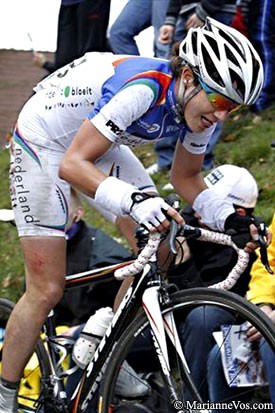Out of competition testing is surprisingly lax
 The UCI has long pushed the fact that professional cyclists are tested more often than competitors in other sports, using this to show that the sport is serious about tackling the drug problems which dogged it in the past. However while the biological passport has undoubtedly led to far more testing being carried out, it appears that women’s cycling is another matter indeed.
The UCI has long pushed the fact that professional cyclists are tested more often than competitors in other sports, using this to show that the sport is serious about tackling the drug problems which dogged it in the past. However while the biological passport has undoubtedly led to far more testing being carried out, it appears that women’s cycling is another matter indeed.
World number one and Olympic champion Marianne Vos is one of several who are pushing for more out of competition testing, decrying the fact that there are hardly any surprise controls. Vos also highlights that in-competition examinations are also sometimes not up to scratch, citing a recent example.
The 23 year old Dutchwoman revealed to Bike Pure this week that she had only faced one out of competition testing thus far in 2010. “It is important that there are more out of competition controls,” she told the anti-doping movement, which has thousands of members worldwide and features many key professionals. “Of course I have controls in competition almost every week, but that depends on my results.”
“We really need to put effective barriers in place to prevent riders who are tempted to take drugs, and I think an increase in out of competition controls will raise a barricade.”
She also revealed that there was a serious shortfall at last weekend’s World Cup in Sweden: “In Sweden there was no doping control because the doctor was either ill, on holiday or there was some sort of miscommunication which can happen at times,” said Vos, who is the current world cyclo-cross champion.
Bike Pure also spoke to several others on the matter, and received further calls for the UCI to step up to its responsibilities and ensure that unfair advantage is not being gained in women’s competition. While the salaries and prize money are smaller, the possibility that some are using banned substances or methods cannot be discounted, and it would be naïve to think otherwise.
As an example, former top Candian competitor Geneviève Jeanson admitted to using EPO almost continuously since her teenage years. She won several World Cup races but was finally snagged when she had a out of competition test on 25 July 2005 at the Tour de ‘Toona stage race in Pennsylvania. She tested positive for the banned hormone and subsequently announced her retirement, saying that her coach André Aubut had played a major part in her decision to dope.
Jeanson’s case highlights the importance of out of competition testing, and also of the need for the UCI not to concentrate uniquely on men’s competition.
Another competitor who backs up Vos’ calls for action is the top off-road rider Katie Compton. Like Vos, she is a member of Bike Pure and wants the UCI – and WADA – to do more. “It’s really gratifying knowing how strict USADA is during the drug testing process compared to WADA. Sometimes I get nervous with the lax attitude of WADA in case they make a mistake and ruin my career.”
Her husband Mark said that she wasn’t exposed to any out of competition prior to entering the testing pool in January. He said that top cyclo-cross riders don’t qualify for testing under WADA or USADA rules.
Australian time trial champion Amber Halliday and her compatriot Tiffany Cromwell are similarly dissatisfied. “I am surprised at the lack of testing in cycling, especially considering the sports reputation and the push for cleanliness,” said Halliday.
“As an international rower I was tested at least three times a year, with two of those being out of competition. I’ve been in cycling almost two years and can only recall being tested once with another blood test that I was told was to take some baseline levels.”
Cromwell has a similar tale to tell. “I have never been tested out of competition in Europe and I’m not on the Australian Sports Anti-Doping Authority (ASADA) whereabouts,” she said. “However I have just been added to the Commonwealth Games whereabouts but have yet to be tested OOC.”
“The only time I have undertaken an OOC test was during an Australian Institute of Sport training camp. Both my house mates Josie Tomic and Chloe Hosking are also rarely, if ever tested out of competition.”
Bike Pure stated that it will push the issue with the UCI and anti-doping bodies. The full article can be read at BikePure.org.